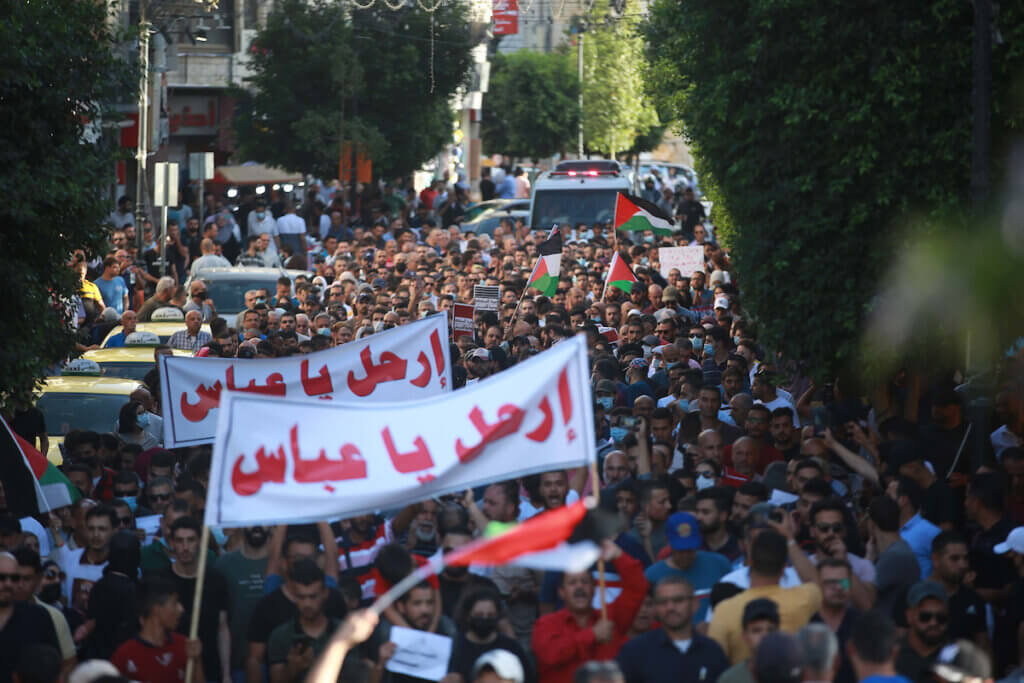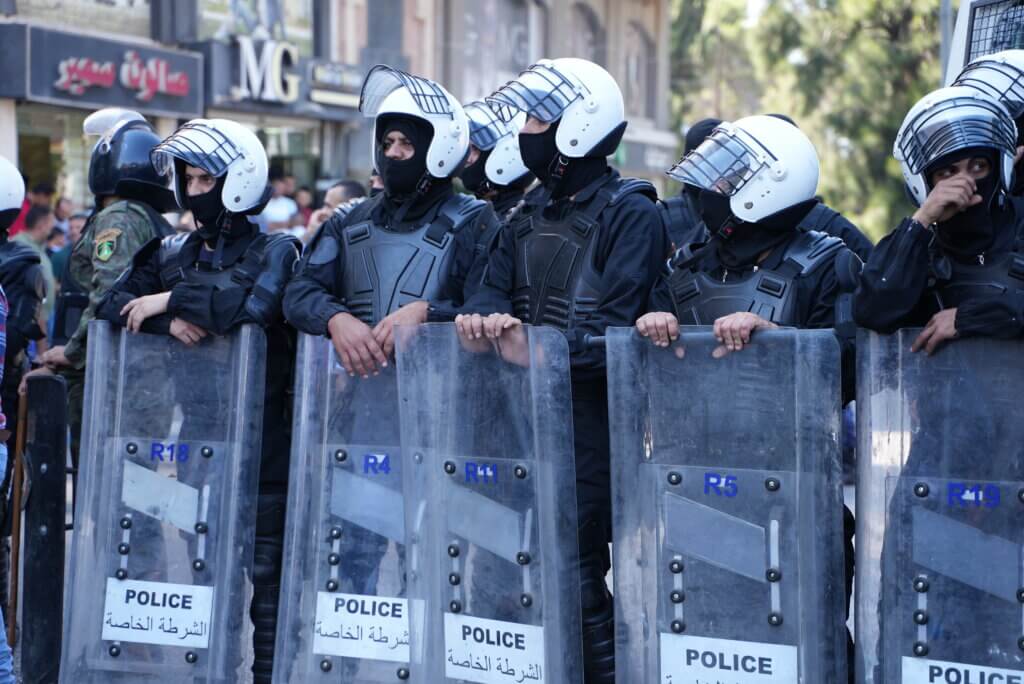Despite an ongoing crackdown and the harassment campaign targeting activists on social media, protests against the PA and the killing of Nizar Banat are ongoing.
BY YUMNA PATEL JULY 5, 2021

PALESTINIAN DEMONSTRATORS PROTESTING PALESTINIAN PRESIDENT MAHMOUD ABBAS IN THE AFTERMATH OF THE DEATH OF ACTIVIST NIZAR BANAT LIFT BANNERS WHICH SAY “LEAVE” DURING A RALLY IN RAMALLAH IN THE OCCUPIED WEST BANK ON JULY 3, 2021. (PHOTO: STR/APA IMAGES)
In the early morning hours of June 24th, Palestinian Authority security forces raided the home of prominent Palestinian activist and dissident Nizar Banat. His family says he was pepper sprayed and brutally beaten with metal clubs and rifle butts before he was taken into custody. Just a few hours later, he was pronounced dead.
The killing of Banat instantaneously sparked outrage on social media, and demonstrations in the occupied West Bank, primarily in the city of Ramallah, the de facto capital of the PA and a stronghold for President Mahmoud Abbas and his Fatah party.
The very beginning of the protests against Banat’s killing in cities like Ramallah, Hebron, and Bethlehem were relatively small and went on undisturbed. Small crowds, including the elderly, women, and children, gathered in central locations in their cities, and held up posters of Banat, calling for those responsible for his killing to be held accountable.
In Ramallah, a short while after the demonstration began in the al-Mara Square on the afternoon of the 24th, PA forces dispersed the peaceful protests with tear gas and sound bombs as soon as people started chanting “Leave leave Abbas.”
As protesters tried to make their way to the ‘muqataa’, or the Presidential Compound, in the center of the city, their paths were blocked by dozens of armed security forces and police.

PA POLICE BLOCK PROTESTERS OUTSIDE THE PRESIDENTIAL COMPOUND IN RAMALLAH, OCCUPIED WEST BANK, DURING DEMONSTRATIONS OVER THE KILLING OF ACTIVISTS AND DISSIDENT NIZAR BANAT. JUNE 24, 2021 (PHOTO: YUMNA PATEL)
On the third day of protests, things took a turn as the PA launched a brutal crackdown on protesters, primarily young Palestinian men and women, who were peacefully marching through the city of Ramallah.
PA security forces fired tear gas and sound bombs at the crowds, while plain clothes officers with the PA intelligence and preventative security services, along with Fatah loyalists, attacked protesters with rocks and wooden bats. Many protesters were physically assaulted by the plain clothes officers and dragged through the streets before they were detained by uniformed officers.
The brutal treatment of the protesters sparked even more outrage on social media, and led to larger and more frequent protests that spread to other areas of the West Bank. In response, Fatah loyalists and PA officials have staged several pro-Abbas demonstrations in Ramallah, Bethlehem, Hebron, and other areas.
Attacking journalists
During demonstrations in Ramallah last week, PA forces were accused of directly attacking journalists and human rights workers documenting the protests.
Several accounts surfaced on social media of journalists being physically and verbally assaulted by plain clothes officers. Others had their cameras broken, and activists and human rights observers having their phones stolen.
Many of the accounts of physical and verbal assault came from Palestinian women journalists, who say in addition to being beaten up and directly targeted while wearing their press jackets, they were harassed by plainclothes officers, and even threatened with rape.
While covering protests in the city of Bethlehem, the Mondoweiss team and other journalists, who were clearly marked as press, were threatened on several occasions by masked plain clothes officers to stop filming the protests.
Palestinian journalists have called on their local authorities and the UN to protect press freedoms in the wake of the crackdown. Last week, a group of more than 50 journalists submitted a letter to the UN to take “necessary and immediate measures” to protect local journalists.
Palestinian Prime Minister Mohammed Shtayyeh called for “respect for press freedoms” and for “everyone to exercise a higher sense of responsibility,” while the Palestinian Journalists Union called for the dismissal of the Palestinian police chief, for “failing to protect journalists who have been assaulted and threatened by plainclothes in plain sight of the police.”
For many journalists, however, these calls were mere rhetoric, as little has been done to protect them since, or hold accountable those responsible for the attacks on the press.
On social media, many Palestinian journalists posed photos of their cut-up Press IDs, in protest of the failure of the journalists union to protect them.
Sexual harassment of female protesters
In addition to attacks on journalists, the PA and Fatah loyalists have waged a harassment campaign on social media targeting protesters and activists, specifically women.
During protests in Ramallah, several instances were reported of female protesters having their phones stolen by plain clothes officers. In the days following, Facebook pages associated with PA officers began posting private and compromising photos taken from the stolen phones of female protesters.
Sources told Mondoweiss that Whatsapp groups being run by local Fatah officials and members of the party were circulating private photos stolen from womens’ phones, along with degrading messages, many of which were sexual in nature.
Despite efforts by activists on social media to report the pages and have them taken down, the online harassment of female activists and protesters has continued, in what they say is an effort to intimidate them and weaponize their bodies against them.
Israel, PA arrest activists
The crackdown of Palestinian activists and critics has continued in recent days, with Israeli forces detaining prominent human rights lawyer and activist Farid al-Atrash over the weekend as he was passing through a military checkpoint on his way home to Bethlehem.
Al-Atrash, who has been targeted and arrested several times by Israeli authorities has been active in the protests over the killing of Nizar Banat, and has been vocal in his criticism of the PA and its treatment of protestors.
Many Palestinians have speculated that Israel’s arrest of al-Atrash was done in coordination with the PA. It is a common practice for the PA to arrest Palestinian activists wanted by Israel and then hand them over to the Israeli authorities, and vice versa, as part of the widely-condemned policy of security coordination.
On Sunday, PA forces arrested Palestinian human rights activist and lawyer Muhannad Karajeh, who was also an active participant in the recent protests.
Over the weekend Palestinian journalist and activist Alaa Rimawi announced that he would be going on hunger strike in protest of his detention by the PA. Rimawi’s family says that he has not been charged with anything, and was detained on “political grounds” by the “corrupt PA”.
Less than a month ago, Rimawi was released from Israeli detention after he went on a similar hunger strike.
Prior to the arrest and killing of Banat, PA forces had also detained prominent Palestinian activist Issa Amro, a popular critic of the PA who recently faced trial in Israeli military courts for his activism in the West Bank.
Protests to continue
Despite the ongoing crackdown and the harassment campaign targeting activists on social media, protests against the PA and the killing of Nizar Banat are ongoing.
On Saturday, Ramallah saw what was perhaps the largest protest against the PA since demonstrations began two weeks ago. People continued to call for the end of the PA, and the immediate fall of Abbas and his regime.
Protests like the one on Saturday are expected to continue, as there has yet to be any formal action taken against those responsible for Banat’s killing.
Last week, the PA justice minister and head of the investigation committee into the death of Banat said the activist was subjected to physical violence and his death was “unnatural”. The investigation concluded that Banat died as a result of “neurological shock” and “acute heart and pulmonary failure.”
The investigation was handed over to Prime Minister Shtayyeh “who in turn will pass it on to the head of the military judiciary in order to take legal measures and investigate suspects,” Al Jazeera reported.
Banat’s family has continued to denounce his killing as an “assassination” and has called for the security officers responsible for his death to be publicly tried in the courts.
No comments:
Post a Comment